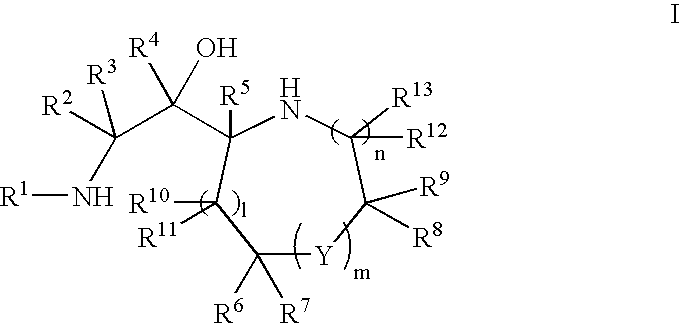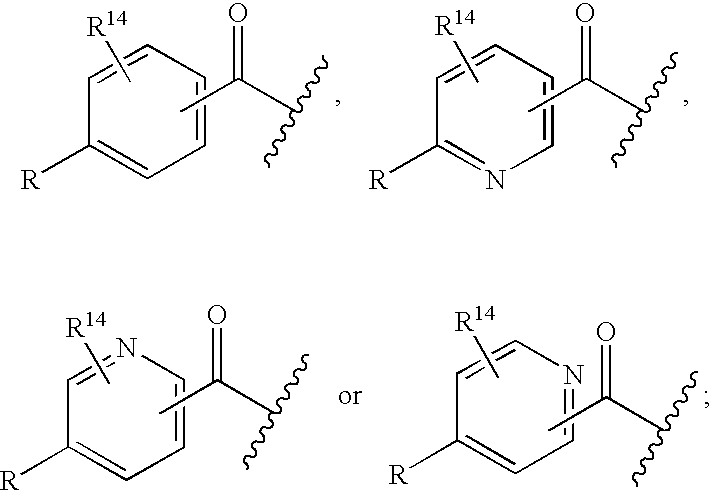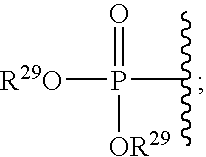Cyclic amine BACE-1 inhibitors having a benzamide substituent
a technology of cyclic amine bace-1 and inhibitor, which is applied in the direction of biocide, group 5/15 element organic compounds, drug compositions, etc., can solve the problem of not preventing disease progression
- Summary
- Abstract
- Description
- Claims
- Application Information
AI Technical Summary
Benefits of technology
Problems solved by technology
Method used
Image
Examples
preparation 1
[0199]
[0200]To a RT solution of 5-methylisophthalic acid (6.68 g, 37.1 mmol) and DIEA (19.7 ml, 14.4 g, 111 mmol) in CH2Cl2 (74 ml) were added sequentially di-n-propyl-amine (5.1 ml, 3.75 g, 37.1 mmol), HOBt (5.01 g, 37.1 mmol) in two portions, and EDCl (7.11 g, 37.1 mmol) in four portions. The reaction mixture was stirred for 24 h, then diluted with 1 N HCl. The mixture was stirred vigorously for 15 min, and the copious solid that precipitated was removed by filtration. The filtrate was diluted with water, and the aqueous phase was adjusted to pH˜1. The phases were separated and the aqueous layer extracted twice with CH2Cl2. The combined organics were dried (MgSO4), filtered, and concentrated. This crude residue was purified by column chromatography (silica, 0→100% EtOAc / hexanes) to give a semi-solid that was further recrystallized from 15% EtOAc / hexanes to give the product (4.5 g). Additional product (2.4 g) was obtained by a second column chromatography of the crystallization mot...
preparation 2
[0201]
[0202]To a solution of isophthalic acid monomethyl ester (1.00 g, 5.55 mmol) in DMF (10 ml) were added sequentially di-n-propylamine (0.77 ml, 0.56 g, 5.6 mmol), HOBt (1.12 g, 8.32 mmol), and EDCl (1.60 g, 8.32 mmol). The resulting mixture was stirred for 3 h and then diluted with water and EtOAc. The phases were separated, and the aqueous portion was extracted with EtOAc (2×). The combined organic fractions were washed with 1 N HCl and brine, dried over MgSO4, filtered, and concentrated. The residue was purified by column chromatography (silica, 5%→25% EtOAc / hexanes) to give a product (1.34 g, 5.09 mmol, 92%).
[0203]To a solution of the above material (1.34 g, 5.09 mmol) in MeOH (10 ml) was added a 1 N aq. LiOH solution (7.63 ml, 7.63 mmol). After 18 h, the mixture was adjusted to pH˜1 with 1 N HCl, and EtOAc was added. The phases were separated, and the aqueous layer was extracted with EtOAc (2×). The combined organic portions were washed with brine, dried over MgSO4, filtere...
preparation 3
[0204]
[0205]By essentially the same procedure set forth in Preparation 1, the above compound was prepared from 5-methylisophthalic acid and (R)-2-(methoxymethyl)pyrrolidine.
PUM
| Property | Measurement | Unit |
|---|---|---|
| flow rate | aaaaa | aaaaa |
| flow rate | aaaaa | aaaaa |
| flow rate | aaaaa | aaaaa |
Abstract
Description
Claims
Application Information
 Login to View More
Login to View More - R&D
- Intellectual Property
- Life Sciences
- Materials
- Tech Scout
- Unparalleled Data Quality
- Higher Quality Content
- 60% Fewer Hallucinations
Browse by: Latest US Patents, China's latest patents, Technical Efficacy Thesaurus, Application Domain, Technology Topic, Popular Technical Reports.
© 2025 PatSnap. All rights reserved.Legal|Privacy policy|Modern Slavery Act Transparency Statement|Sitemap|About US| Contact US: help@patsnap.com



